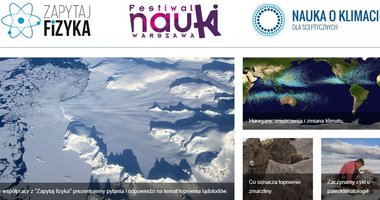
Photonics Department, IGF FUW
Photonics interconnects optics, electronics and computer science, covering research areas of a practical application of electromagnetic radiation. It investigates the properties and applications of visible light, as well as infrared and ultraviolet rays. The information carrier is the stream of photons, unlike the stream of electrons, which is the basis of electronics. The origins and development of photonics were initiated by the invention of the laser in 1960, and the development of semiconductors, optical fibre and nonlinear and ultrafast optics. Photonics, and especially its part relating to systems based on photonic crystals and plasmonic elements, is increasingly used as a complementary or replacement element to electronics, going beyond current telecommunication applications, sensors and displays.
At the Photonics Department of the Institute of Geophysics, Faculty of Physics, University of Warsaw, we conduct our research on photonics, optics and optometry. As part of the Photonics specialization, we educate physicists in the field of photonic crystal optics, diffraction optics and plasmonics, with the use of mathematical methods as well as information optics methodology. Under the field of bachelor’s European Studies on Ophthalmic Optics and Optometry (ESOOiO) and master’s studies on Optometry with a practical profile, we educate students following the standards of the European Council of Optometry and Optics. The area of knowledge acquired as part of ESOOiO and Optometry studies covers the basics of physics, mathematics, biology, chemistry, medicine and information technology, as well as optometry, ophthalmic optics, contactology and orthoptics specifics.
The main research project TEAM-NET QUNNA is led by prof. dr hab. Ryszard Buczyński and executed as part of an interdisciplinary consortium (the University of Warsaw, Faculty of Physics, consortium leader; Jagiellonian University, Faculty of Physics, Astronomy and Applied Computer Science; Gdańsk University of Technology, Faculty of Electronics, Telecommunications and Informatics and Institute of Biotechnology and Molecular Medicine), financed by the Foundation for Polish Science under the Smart Growth Operational Programme.
The TEAM-NET QUNNA research project aims to apply phenomena from the field of quantum physics to the implementation of technology based on the use of nanodiamonds to develop innovative sensors for optical and magnetic research, electronics and medical diagnostics, such as the diagnosis of neurodegenerative and cancer diseases. As a leader of the project, our scientists are developing the strategy, methods and technology for connecting different glass platforms with nanodiamonds. The work addresses the challenges of advancing the field of biodiagnostics using photonics and ultrafast optics instruments with shaped nonlinearity.
The Photonics Department consists of the following research groups:
- Structured optics and optofluidics (prof. dr hab. Ryszard Buczyński) – the research group has many years of experience in the design, development (technology) and characterization of photonic and nanostructured optical fibres as well as air-core and hybrid optical fibres (combining optical, imaging, electrical and microfluidic functionalities).
- Microoptics (dr hab. Rafał Kasztelanic) – the main interest of this research group is modelling, characterization and practical use of optical elements on a micro-scale, such as gradient lenses (GRIN), structured optical elements and matrices of optical elements. Research is carried out in both visible and near-infrared light.
- Biophotonics and vision optics (dr hab. Jacek Pniewski) – the research group's focus is set on the issues between biological and physical-optical (photonic) sciences, with a strong emphasis on the human visual system. The ongoing projects are dedicated to surface characteristics of contact lenses, dynamics of refraction of the eye visual system, autorefractometry, aberrations of ophthalmic lenses, statistical analysis of keratometric parameters, and features of colour vision.
Part of the research is carried out within the bachelor's thesis (course: European Studies on Ophthalmic Optics and Optometry) and master's thesis (course: Optometry). Scientific research and specialized didactic classes take place within the Academic Centre for Education of Optometrists at the University of Warsaw, operating as a student's laboratory, with a clinical part allowing for the admission and examination of patients.



